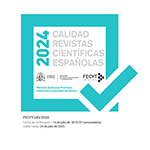Knowledge production in Social Work: toward a decoloniality of knowledge
Abstract
The knowledge production enshrined in the modernity/coloniality duality has conditioned our way of seeing, thinking about, sensing and interpreting the world. With this thought matrix, the “objective” world is one that is far removed from human experience. It is a world invented by a subject who thinks of themselves as a “neutral observer”. As stated by Mignolo (2014), theological and egological policies of knowledge are based on the suppression of sensibility and the geo-historical location of the body. Herein lies the paradox of modernity: it creates a cognitive subject while at the same time eliminating it from the process of knowledge production. Subjects think of themselves as a reflective surface. They are capable of forming an image of external nature, prior to and independent of it. Following this logic, social sciences have distanced themselves from what they are theorizing about. They have placed the world and what happens within it in a situation of remoteness and estrangement, with the assumption of constructing objective and reliable scientific knowledge. Social work has not been immune to this process of coloniality of knowledge. This work seeks to offer a contribution to the process of decolonial construction of knowledge, which necessarily entails an epistemological shift in knowledge production, as well as passing from discipline to indiscipline. Our bases for this work are contributions from epistemology of the south, feminist epistemology, ‘epistemology outsider’ and border thinking.Downloads
Article download
License
In order to support the global exchange of knowledge, the journal Cuadernos de Trabajo Social is allowing unrestricted access to its content as from its publication in this electronic edition, and as such it is an open-access journal. The originals published in this journal are the property of the Complutense University of Madrid and any reproduction thereof in full or in part must cite the source. All content is distributed under a Creative Commons Attribution 4.0 use and distribution licence (CC BY 4.0). This circumstance must be expressly stated in these terms where necessary. You can view the summary and the complete legal text of the licence.









